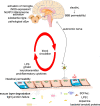Review: The Role of Intestinal Dysbiosis in Parkinson's Disease
- PMID: 33968794
- PMCID: PMC8100321
- DOI: 10.3389/fcimb.2021.615075
Review: The Role of Intestinal Dysbiosis in Parkinson's Disease
Abstract
Several studies have highlighted the roles played by the gut microbiome in central nervous system diseases. Clinical symptoms and neuropathology have suggested that Parkinson's disease may originate in the gut, which is home to approximately 100 trillion microbes. Alterations in the gastrointestinal microbiota populations may promote the development and progression of Parkinson's disease. Here, we reviewed existing studies that have explored the role of intestinal dysbiosis in Parkinson's disease, focusing on the roles of microbiota, their metabolites, and components in inflammation, barrier failure, microglial activation, and α-synuclein pathology. We conclude that there are intestinal dysbiosis in Parkinson's disease. Intestinal dysbiosis is likely involved in the pathogenesis of Parkinson's disease through mechanisms that include barrier destruction, inflammation and oxidative stress, decreased dopamine production, and molecular mimicry. Additional studies remain necessary to explore and verify the mechanisms through which dysbiosis may cause or promote Parkinson's disease. Preclinical studies have shown that gastrointestinal microbial therapy may represent an effective and novel treatment for Parkinson's disease; however, more studies, especially clinical studies, are necessary to explore the curative effects of microbial therapy in Parkinson's disease.
Keywords: Parkinson’s disease; inflammation; intestinal dysbiosis; molecular mimicry; α-synuclein.
Copyright © 2021 Huang, Liao, Liu, Zhong, Cai and Long.
Conflict of interest statement
The authors declare that the research was conducted in the absence of any commercial or financial relationships that could be construed as a potential conflict of interest.
Figures

References
Publication types
MeSH terms
LinkOut - more resources
Full Text Sources
Medical

